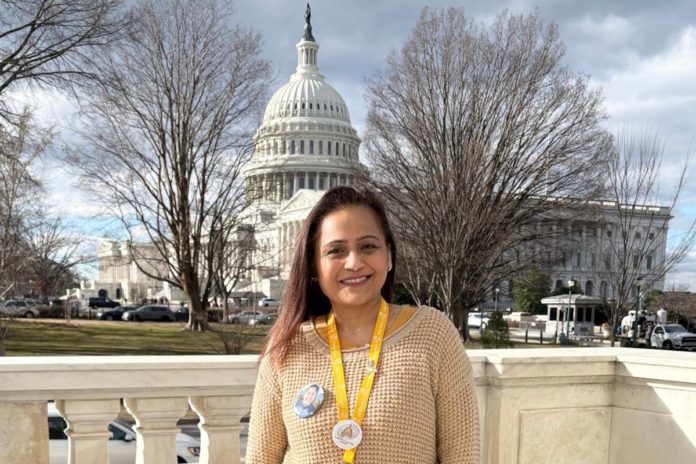Advocates continue the fight for childhood cancer research as the current administration announces budget cuts to the National Institute of Health, the hub of medical research. The 15% cap on overhead costs announced this year disrupts the entire system of research institutions that need the money for building compliance costs, utilities, equipment, researcher wages and more.
Fremont resident Manisha Modi Mehta, who lost her son to cancer in 2018, is making sure cancer research funding is prioritized. Her work with American Cancer Society Cancer Action Network (ACS CAN) and the nonprofit she co-founded—Neev Kolte and Brave Ronil Foundation—focuses on childhood cancer research funding and advocacy. ACS CAN works with a nation-wide network of volunteers, empowering them to advocate for cancer research.
Mehta advocates at a national, state and local level. She recently joined other volunteers from 39 states as childhood cancer advocates for an event called the 15th Annual Alliance for Childhood Cancer Action Days. It took place Feb. 27 and 28 at the nation’s capital. Cancer patients, survivors and their families joined a visit to congressional offices.
They asked lawmakers to support the Accelerated Kids’ Access to Care Act, which reduces medical delays for children who need cancer treatments and clinical trials covered by Medicaid.
They also urged Congress to support the Give Kids a Chance Act, which would make sure pediatric studies happen for kids with cancer and to look into child doses for cancer drugs and treatments.

The group urged lawmakers to prioritize federal funding for the Childhood Cancer Survivorship, Treatment, Access and Research (STAR) Act. Enacted in 2018, the law focused on childhood cancer research and accelerated the availability of childhood cancer treatments.
Mehta is a legislative ambassador, a volunteer position under ACS CAN. Legislative ambassadors meet once a month to discuss their organizing efforts, including events, fundraisers, engaging community members about goings on with cancer, and volunteer recruitment.
The continuing resolution bill passed on March 15 to prevent a government shutdown will supposedly fund the STAR Act. ACS CAN associate director Priscilla Cabral-Pérez said in an email they will have to wait and see if the U.S. government will allocate money to STAR.
In Washington D.C., Mehta spoke to Representative Ro Khanna’s legislative staff about her son Ronil, who passed away at 14 from a pediatric cancer called Diffuse Intrinsic Pontine Glioma (DIPG). It’s an aggressive brain tumor located in the brain stem—called the pons, starting in the brain stem’s glial cells.
“Basically it’s inside the pons part of the brain, and because it’s diffused there is no way to get inside the pons. It’s not a solid tumor they can just remove,” Mehta said during a Zoom interview. It affects vital human functions like eating, walking and talking.
Mehta said once a child is diagnosed with DIPG, their survival rate is eight to 12 months. She said only 1% of children diagnosed with DIPG will survive for five years. In the United States about 300 children ages five to 10 are diagnosed with DIPG every year, according to the National Cancer Institute website. As of today there is no cure for DIPG, and treatments rely on research.
Along with a couple whose son also passed away from DIPG, Manisha founded a nonprofit called Neev Kolte and Brave Ronil Foundation, named after their two sons. The nonprofit works on supporting advocacy efforts and DIPG research through grants. Mehta said they also support families that go to California for clinical trials. They also have multiple programs and support systems, including support calls where organizers connect families to doctors who specialize in DIPG.
The foundation uses strategies like reaching out to communities about DIPG and other childhood cancer diseases. “We try to raise awareness that childhood cancer is an issue and research is extremely underfunded; kids are dying,” Mehta said. She said the reason child cancer research can be underfunded is because children are the smallest patient population and because childhood cancer is rare compared to adult cancer.
The ACS CAN press release says brain cancer is the leading cause of cancer-related death for children ages one to four. The website cancer.org says about 9,550 children in the U.S. will be diagnosed with cancer this year.
A vital funding source for cancer researchers right now is grants. Neev Kolte and Brave Ronil Foundation have awarded a $100,000 grant to fund a local DIPG clinical trial research at the University of California San Francisco. A $70,000 national grant was awarded to researchers from the Children’s Hospital of Philadelphia. This research includes a clinical trial to find out if PET imaging, commonly used for prostate cancer, can be safe to use for children with high-grade gliomas.
“They rely on us to fund their research,” Mehta said. “Without their critical support, we’re at the risk of losing the next generation of lifesaving treatments that can offer hope to families in need.”
To learn more about donating and volunteer opportunities, visit neevronil.org.




